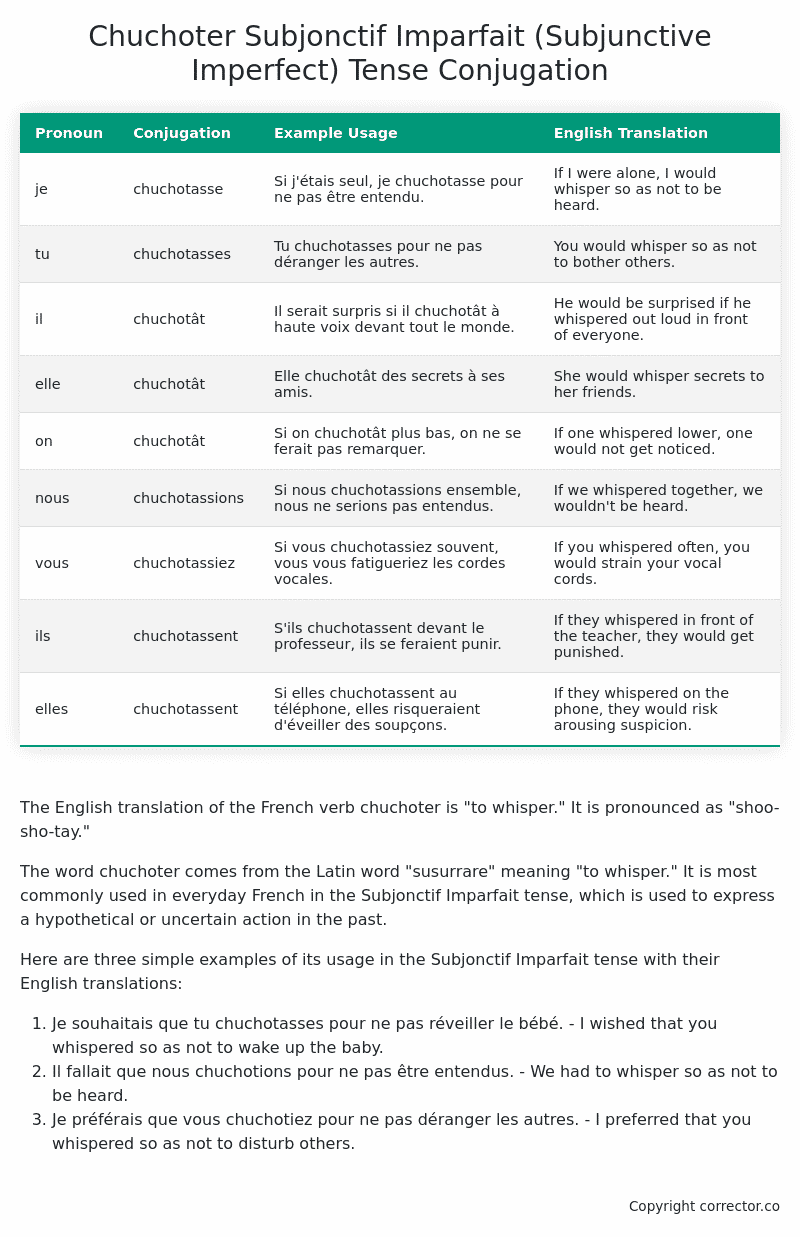Subjonctif Imparfait (Subjunctive Imperfect) Tense Conjugation of the French Verb chuchoter
Introduction to the verb chuchoter
The English translation of the French verb chuchoter is “to whisper.” It is pronounced as “shoo-sho-tay.”
The word chuchoter comes from the Latin word “susurrare” meaning “to whisper.” It is most commonly used in everyday French in the Subjonctif Imparfait tense, which is used to express a hypothetical or uncertain action in the past.
Here are three simple examples of its usage in the Subjonctif Imparfait tense with their English translations:
- Je souhaitais que tu chuchotasses pour ne pas réveiller le bébé. – I wished that you whispered so as not to wake up the baby.
- Il fallait que nous chuchotions pour ne pas être entendus. – We had to whisper so as not to be heard.
- Je préférais que vous chuchotiez pour ne pas déranger les autres. – I preferred that you whispered so as not to disturb others.
Table of the Subjonctif Imparfait (Subjunctive Imperfect) Tense Conjugation of chuchoter
| Pronoun | Conjugation | Example Usage | English Translation |
|---|---|---|---|
| je | chuchotasse | Si j’étais seul, je chuchotasse pour ne pas être entendu. | If I were alone, I would whisper so as not to be heard. |
| tu | chuchotasses | Tu chuchotasses pour ne pas déranger les autres. | You would whisper so as not to bother others. |
| il | chuchotât | Il serait surpris si il chuchotât à haute voix devant tout le monde. | He would be surprised if he whispered out loud in front of everyone. |
| elle | chuchotât | Elle chuchotât des secrets à ses amis. | She would whisper secrets to her friends. |
| on | chuchotât | Si on chuchotât plus bas, on ne se ferait pas remarquer. | If one whispered lower, one would not get noticed. |
| nous | chuchotassions | Si nous chuchotassions ensemble, nous ne serions pas entendus. | If we whispered together, we wouldn’t be heard. |
| vous | chuchotassiez | Si vous chuchotassiez souvent, vous vous fatigueriez les cordes vocales. | If you whispered often, you would strain your vocal cords. |
| ils | chuchotassent | S’ils chuchotassent devant le professeur, ils se feraient punir. | If they whispered in front of the teacher, they would get punished. |
| elles | chuchotassent | Si elles chuchotassent au téléphone, elles risqueraient d’éveiller des soupçons. | If they whispered on the phone, they would risk arousing suspicion. |
Other Conjugations for Chuchoter.
Le Present (Present Tense) Conjugation of the French Verb chuchoter
Imparfait (Imperfect) Tense Conjugation of the French Verb chuchoter
Passé Simple (Simple Past) Tense Conjugation of the French Verb chuchoter
Passé Composé (Present Perfect) Tense Conjugation of the French Verb chuchoter
Futur Simple (Simple Future) Tense Conjugation of the French Verb chuchoter
Futur Proche (Near Future) Tense Conjugation of the French Verb chuchoter
Plus-que-parfait (Pluperfect) Tense Conjugation of the French Verb chuchoter
Passé Antérieur (Past Anterior) Tense Conjugation of the French Verb chuchoter
Futur Antérieur (Future Anterior) Tense Conjugation of the French Verb chuchoter
Subjonctif Présent (Subjunctive Present) Tense Conjugation of the French Verb chuchoter
Subjonctif Passé (Subjunctive Past) Tense Conjugation of the French Verb chuchoter
Subjonctif Imparfait (Subjunctive Imperfect) Tense Conjugation of the French Verb chuchoter (this article)
Subjonctif Plus-que-parfait (Subjunctive Pluperfect) Tense Conjugation of the French Verb chuchoter
Conditionnel Présent (Conditional Present) Tense Conjugation of the French Verb chuchoter
Conditionnel Passé (Conditional Past) Tense Conjugation of the French Verb chuchoter
L’impératif Présent (Imperative Present) Tense Conjugation of the French Verb chuchoter
L’infinitif Présent (Infinitive Present) Tense Conjugation of the French Verb chuchoter
Struggling with French verbs or the language in general? Why not use our free French Grammar Checker – no registration required!
Get a FREE Download Study Sheet of this Conjugation 🔥
Simply right click the image below, click “save image” and get your free reference for the chuchoter Subjonctif Imparfait tense conjugation!

Chuchoter – About the French Subjonctif Imparfait (Subjunctive Imperfect) Tense
Formation
Common Everyday Usage Patterns
Interactions with Other Tenses
Subjonctif Présent
Indicatif Passé Composé
Conditional
Conditional Perfect
Summary
I hope you enjoyed this article on the verb chuchoter. Still in a learning mood? Check out another TOTALLY random French verb conjugation!


